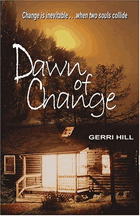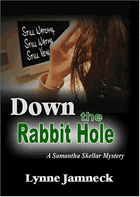Arlene Germain, for many years a teacher of English and Creative Writing, lives with her partner in Massachusetts. She is a book reviewer for The Midwest Book Review, The Independent Gay Writer, the JustAboutWrite.com Newsletter/E-zine, the Golden Crown Literary Society newsletter, The Crown, and The OutlookPress.com. Arlene is also a fiction editor. She can be contacted at afgermain@townisp.com.
  Dawn
of Change Dawn
of ChangeBy Gerri Hill Bella Books ISBN: 1-59493-011-2 Paperback $12.95 236 pages Dawn of Change To those around her, Susan Sterling seems to have the perfect life: a successful husband of twenty years, a lovely daughter in college, and the country club society scene. One day she arrives home early to find her husband in their bed with a twenty year-old blonde. Sparing herself the it’s not what it seems speech, she bolts to the family’s cabin in Kings Canyon National Park. Enjoying the solitude and avoiding the meddling of her mother and overbearing sister Ruth, Susan meets Shawn Weber, a young woman who has been camping nearby. The two women strike up a conversation and Susan invites Shawn to dinner. A friendship begins to develop, secrets are shared, and both Susan’s and Shawn’s view of life undergoes subtle yet important changes. A daughter who is confused about her own personal life, a husband who refuses to accept the demise of their marriage, and Shawn’s seemingly mysterious past all contribute to the inner turmoil and uncertainty Susan Sterling is experiencing while sequestered in the woods. Gerri Hill is the author of several impressive romance novels, and Dawn of Change further serves to elevate her status as a leading writer in this genre. Characterization is clearly and deftly written, especially for the protagonist, Susan Sterling. The reader can easily identify and empathize with the upheaval she is experiencing. Somewhere along the way, while being a wife and mother, Susan lost herself, her dreams, her hopes, and she is now confronted with several opportunities to find the woman she had once hoped to be. Her actions and reactions ring true. Avoiding the overly sentimental and melodramatic, Hill has created a character that exudes a realistic portrait of the woman scorned. Her dialogue is moving and at times quite wryly humorous. When her sister Ruth pompously states that she and their mother are worried about Susan, Susan recognizes the insincerity dripping from each word. “Bullshit,” Susan said quietly. “You’re worried what people are thinking and Mother’s only concerned about what time she can have her first scotch” (p. 45). The internal dialogues of both Susan and Shawn further show the reader the complicated emotional wiring that these women possess. Another strong point of this novel is the characterization of Lisa, Susan’s daughter. Hill has created an intelligent, witty, attractive young woman who is coming to terms with her own identity. She is a relevant and contemporary character. Her interactions are multi-faceted. Reading the verbal sparring between Lisa and Ruth is humorous and very telling. Generational differences are only secondary; the disparate temperament, spirit, and integrity of Lisa and Ruth are the true indicators of what constitutes a decent and compassionate individual. Dawn of Change is a fast-paced, comfortably read novel that affects the reader on a variety of levels. Likable and intriguing main characters, vivid descriptions of emotional entanglements and their repercussions, and a fluid and carefully crafted plotline all contribute to this well written novel. The basic premise has been told in other books but not in as skillfully entertaining a manner as Hill has imagined it in Dawn of Change. From the contrast of everyday living with the narcissistic maneuverings of the country club set to the desire to have solitude and quietude in one’s life while at the same time recognizing the possibilities presented with a random meeting along the trail, Hill has managed simultaneously to capture the interest of the reader and to provide serious consideration for some of today’s troublesome societal issues. This reader eagerly looks forward to Hill’s next book. Reviewed by Arlene Germain |
  Down
the Rabbit Hole Down
the Rabbit HoleBy Lynne Jamneck Bella Books ISBN: 1-59493-012-0 Paperback $12.95 193 pages Down the Rabbit Hole Lynne Jamneck’s stellar debut novel is the first in a mystery series featuring Samantha Skellar, an FBI agent working in Seattle. She and her partner, Rob Munroe, are investigating a possible serial killer who has been targeting suburban neighborhoods. The crimes appear to be random, but nonetheless violent. The husband is senselessly murdered and the wife is brutally sexually assaulted. The investigators are finding few leads as they attempt to produce a profile of the perpetrator. Further complicating Skellar’s investigation is an unsettling personal problem. Someone has been watching her every move. This audacious stalker has managed to hack into her computer and has been sending her threatening emails. Since the threats have taken on a new measure of menace, Sam engages the assistance of one Lucy Jane Spoon, a twenty-seven year-old uninhibited laid-back computer expert with a definite dislike for all things resembling authority and government. Add to this mix Kate, Sam’s rock-star sister, and Carol, Sam’s ex-lover, and the reader has more than enough primary and secondary plots to maintain her interest. Jamneck has created a protagonist in Samantha Skellar who is a totally dedicated and professional woman, a woman who has just begun to feel those nagging pressures of her high-powered job. Solving crimes has begun to take its toll, but Sam is intelligent enough to recognize this common pitfall experienced by many law officers. She has also reached that point where a bit of introspection about her past, her family, her love relationships is necessary for her own peace of mind. Sam has flaws, but she has compassion and integrity. Solving the crime is her passion as well as her duty. “Little else encouraged me to professional perfection than the idea of some fucked-up little misogynist criminal, sitting back and laughing at the law, laughing at the FBI. Laughing at me” (p. 50). Her relationship with Munroe is the product of two years of being there for each other, of protecting one another, and of understanding each other’s method of criminal investigation. Lucy Spoon is an engaging and highly satisfying secondary character. She possesses that ability to both rankle and intrigue Sam. An outspoken feminist, Lucy pulls no punches. She states her opinions and beliefs and then leaves it to others to react or ignore. She is neither easily impressed nor intimidated. When Sam first appears asking for computer assistance, she is told that Lucy can’t help her that day but can the next day. Sam responds, “This is really quite important” (p. 12). Lucy looks at Sam completely unimpressed with her FBI status. “What I have to do is important too. Tomorrow. Take it or leave it” (p.12). Through the careful use of foreshadowing, the reader is aware that there is a definite connection between these two assertive women. Discovering what that may be, is one of the many enjoyable aspects of this novel. Down the Rabbit Hole is a well written police procedural with gripping conflicts, realistic conclusions, and surprising twists and turns in both the plotting and the development of characters. Jamneck has created a worthy addition to the mystery genre. The fact that the author chose to have Sam’s sexual identity play a secondary role is a refreshing change from other lesbian mystery detectives. In this instance, the emphasis is upon Sam’s competent performance of her demanding job. The subplot of her romantic relationships or lack of such serves to heighten the authenticity of the character. Her sexuality is a part of her life, not the focus of her life. This indeed lends more credibility to her character as she is first and foremost an FBI investigator in this mystery series. Also interesting and impressive is Jamneck’s clever detailing. Without revealing the conclusion of the book, suffice it to say that Jamneck has incorporated a most original segment of plotting that will indeed segue nicely into the next adventure of Samantha Skellar. Down the Rabbit Hole is a thoroughly riveting and rewarding reading experience—certainly one not to be missed. Reviewed by Arlene Germain |